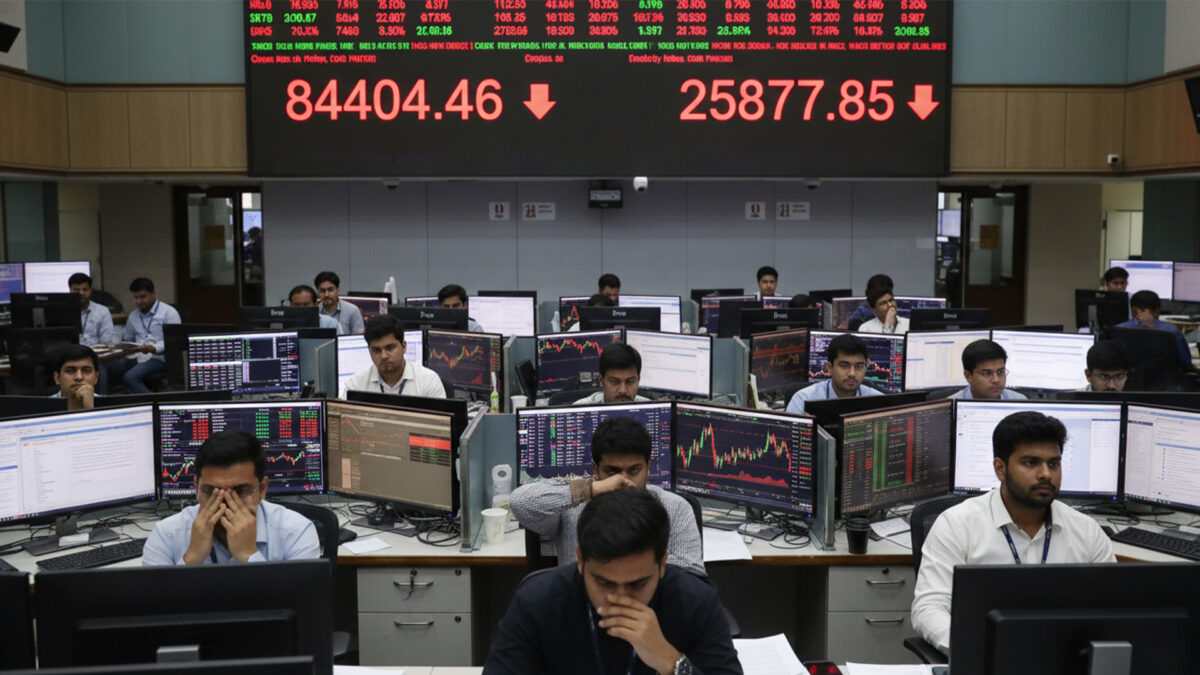Indian equity benchmarks ended lower on Thursday, tracking global weakness after the US Federal Reserve signaled a pause in its rate-cut cycle.
The BSE Sensex fell 592.67 points, or 0.7 percent, to close at 84,404.46, while the NSE Nifty 50 dropped 176.05 points, or 0.68 percent, to settle at 25,877.85.
Investor sentiment was further dented by persistent foreign fund outflows and rising market volatility.
Both indices came under pressure throughout the session, with financials, pharmaceuticals, and telecom stocks leading the decline.
Among major laggards on the Nifty were Dr. Reddy’s Laboratories, HDFC Life Insurance, Sun Pharmaceutical Industries, Bharti Airtel, and Tata Steel, each slipping up to 5 percent.
The market breadth also turned negative as investors opted to book profits at higher levels amid signs of near-term uncertainty.
The sentiment turned cautious after the US Federal Reserve, while announcing a widely expected 25 basis point rate cut, indicated that further easing may not follow soon.
Chair Jerome Powell cited limited availability of fresh economic data due to the ongoing US government shutdown and said the central bank would proceed carefully.
Analysts noted that this stance dampened risk appetite across emerging markets, including India, as investors scaled back expectations of an extended easing cycle.
Market strategists observed that Powell’s remarks had triggered a broad selloff in global equities and bonds, pushing yields higher.
They added that while the Fed has begun to ease, the move was characterized by caution rather than confidence, suggesting volatility could persist until clearer signals on future rate actions emerge.
Rising concerns over sticky inflation and potential downside risks to employment in the US also added to the sense of uncertainty.
Back home, foreign institutional investors (FIIs) remained net sellers, offloading shares worth ₹2,540.16 crore in Wednesday’s session, according to exchange data.
The sustained FII outflows put additional pressure on key indices, as domestic investors struggled to counterbalance the foreign selling.
Market experts believe this trend could continue in the near term, especially if global risk sentiment remains weak and the dollar strengthens further.
Volatility also ticked higher, with the India VIX rising 1.5 percent to 12.16.
The uptick reflected growing nervousness among traders, particularly as the Nifty failed to hold the 26,000 mark and slipped below key support zones.
Technical analysts observed that the Nifty’s upward momentum has begun to show signs of fatigue after recent gains. Indicators such as oscillators suggested hesitation near recent peaks.
However, they maintained that the broader trend remains positive, and dips toward 25,990 are likely to attract buying interest.
Immediate support for the Nifty is seen around 25,886, while a sustained move above 26,050 could restore bullish confidence.
Overall, Thursday’s decline underscored the fragility of investor sentiment in the wake of mixed global signals and continued foreign selling.
Market watchers expect trading to remain range-bound in the coming sessions as participants await more clarity from global central banks and fresh domestic earnings cues.
Also Read: NVIDIA Becomes First $5 Trillion Company Amid AI Surge









